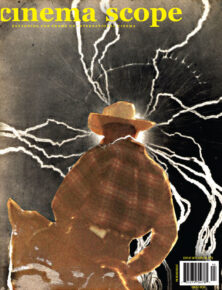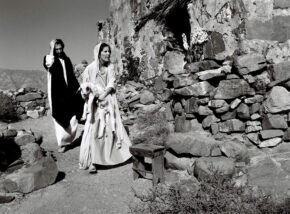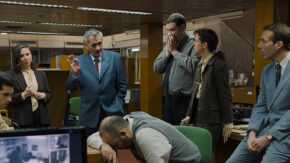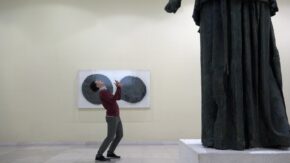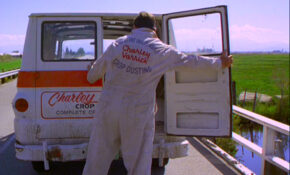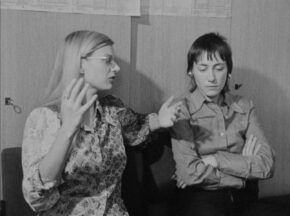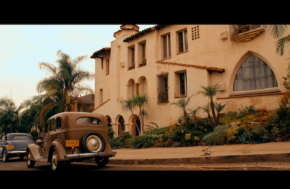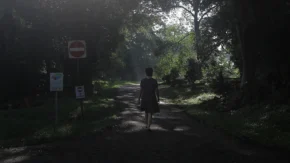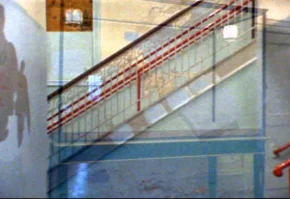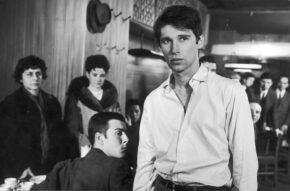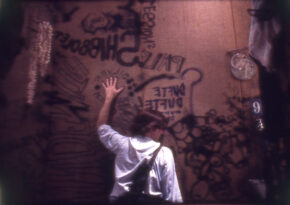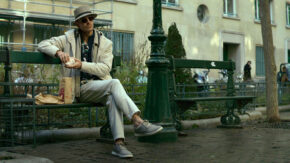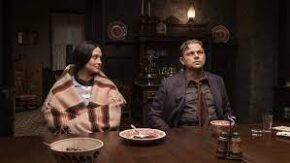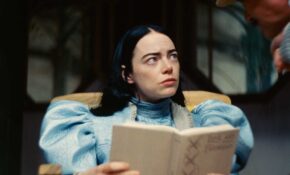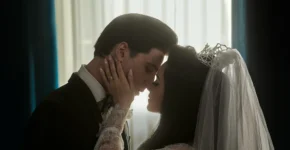CS97
Cinema Scope 97 Table of Contents
By Ed | 01/24/2024 | CS97, From Cinema Scope Magazine, Table of Contents
Issue 97 contents with all the free articles linked. Includes Interviews, Features, Columns, Film/Art and more.
Read More → Issue 97 Editor’s Note
By Ed | 01/23/2024 | Columns, CS97, From Cinema Scope Magazine
I feel like I’ve explained enough in this space over the last year, so that announcing this is the final issue of Cinema Scope is in no way surprising. But let me reiterate that the time has long passed to envision a way of making this magazine sustainable financially without begging for money, or sustainable emotionally without driving me to a premature death...
Read More → Face the Music: Hamaguchi Ryusuke on “Evil Does Not Exist”
By Beatrice Loayza | 01/18/2024 | CS97, From Cinema Scope Magazine, Interviews
Hamaguchi Ryusuke’s sublime eco-fable, Evil Does Not Exist,begins and ends with the plangent score by Ishibashi Eiko, played fortissimo over an extended tracking shot facing skywards. A forest canopy, stark and stripped of its foliage by winter’s spell, appears like latticework through which daylight passes with an eerie vibrancy.
Read More → Your Own Hall of Fame: Alex Ross Perry on “Videoheaven” and “Pavements”
By Adam Nayman | 01/18/2024 | CS97, From Cinema Scope Magazine, Interviews
Two movies, both alike in indignity, in the ’90s, where we lay our scene. Because neither Videoheaven nor Pavements—both putatively non-fictional pop-culture essay films written and directed by Alex Ross Perry—have officially been released, programmed at a festival, or even announced via trailers or posters, it’s tricky to write about their intricacies, either as standalone works or in conversation with one another.
Read More → Objects of Desire: Rodrigo Moreno on “The Delinquents”
By Jordan Cronk | 01/18/2024 | CS97, From Cinema Scope Magazine, Interviews
Until recently a somewhat forgotten figure of the New Argentine Cinema, director Rodrigo Moreno has, with The Delinquents, asserted himself as perhaps that movement’s most underestimated talent.
Read More → From the Vision to the Nail in the Coffin, and the Resurrection: Dimitris Athiridis on “exergue – on documenta 14”
By Antoine Thirion | 01/18/2024 | CS97, From Cinema Scope Magazine, Interviews
As the supervisory board is currently tasked with restructuring the documenta selection process, the fear is that the freedom traditionally granted to the exhibition’s artistic direction will be drastically constrained in order to prevent any new national “scandal” the likes of which occurred around documenta 15 in 2022.
Read More → Last of the Independents: A Roundtable on “Charley Varrick” with Veronika Franz and Severin Fiala
By Christoph Huber | 01/18/2024 | CS97, Features, From Cinema Scope Magazine
Don Siegel’s superior crime picture Charley Varrick (1973) was supposed to be called Last of the Independents, but that title was nixed by Universal honcho Lew Wasserman. This probably gives even more credence to the subversive, stick-it-to-the-system notion nestled inside this tale of a crop-duster pilot who has resorted to small-scale robbery for a living because he can no longer compete against the capitalist monopoly in his legal job.
Read More → Deep Cuts: The First International Women’s Film Seminar
By Erika Balsom | 01/18/2024 | CS97, Features, From Cinema Scope Magazine
Lately it feels like everywhere I look obscure old films are being dusted off and presented to eager publics. Even a right-wing newspaper like London’s Telegraph had cause last November to speak of a “repertory boom” in the city where I live, deeming it “the year’s most unlikely media trend.” Their idea of what this looks like is a bit different than mine; not everyone is “suddenly” lining up to see Kind Hearts and Coronets (1949).
Read More → Open Source: Some Films by Ross Meckfessel
By Phil Coldiron | 01/18/2024 | CS97, Features, From Cinema Scope Magazine
It requires relatively little mental strain to imagine a world in which all that can be photographed has been; it requires, I think, considerably more to imagine one in which every possible photograph has been made. I find that both of these little thought experiments imply comic narratives—that is, to borrow a definition, ones which resolve in favour of their protagonists. And who might these protagonists be?
Read More → Film Tourists in Los Angeles
By Thom Andersen | 01/18/2024 | CS97, Features, From Cinema Scope Magazine
The directors who did the most to make Los Angeles a character in movies and then a subject were outsiders, like Wim Wenders and Billy Wilder, or tourists, like Antonioni. They weren’t interested in what made Los Angeles like a city; they were interested in what made Los Angeles unlike the cities they knew.
Read More → Out of Time: The Videos of Tulapop Saenjaroen
By Jesse Cumming | 01/18/2024 | Columns, CS97, Film - Art, From Cinema Scope Magazine
Few contemporary artists feel as attuned to late capitalism—and its insidious means of extracting both our time and resources—as Saenjaroen, whose works offer means of escape from or refutation of these forces.
Read More → The Sense of the Past: Terence Davies (1945–2023)
By Lawrence Garcia | 01/18/2024 | Columns, CS97, Deaths of Cinema, From Cinema Scope Magazine
To describe a film as being “about memory” is almost as cliché as to say that it is “about time.” Few subjects are thought to be more suited to a temporal medium defined by its mechanical recording apparatus. Yet the films of the late Terence Davies are to my mind the rare works actually deserving of such a description.
Read More → The World in Focus: Vincent Grenier (1948-2023)
By Michael Sicinski | 01/18/2024 | Columns, CS97, Deaths of Cinema, From Cinema Scope Magazine
While I would never compare the end of a magazine’s run with the end of a person’s life, there is a painful appropriateness to the fact that I am eulogizing my friend, filmmaker Vincent Grenier, in the final issue of Cinema Scope. Grenier’s work represents a tactile, phenomenological cinema that is not very popular with current tastemakers.
Read More → Dead Slow Ahead: On Joe Pera
By Kate Rennebohm | 01/18/2024 | Columns, CS97, From Cinema Scope Magazine, TV, TV or not TV
Enter Joe Pera, the comedian, actor, director, writer, and producer whose self-financed, self-produced, and self-released comedy special, Joe Pera: Slow & Steady, dropped on his YouTube channel in early October.
Read More → Global Discoveries on DVD: Now or Never
By Jonathan Rosenbaum | 01/18/2024 | Columns, CS97, DVD Reviews, From Cinema Scope Magazine
In what will likely be my last column in these pages, I’ve mainly tried to highlight releases and films that I’ve been meaning yet failing to watch for ages, following the assumption that it’s now or never. As most of my examples make clear, this avoidance has something to do with the unhealthiness or pessimism these films tend to leak from every pore.
Read More → Pale Shibboleth: Will Hindle’s “Chinese Firedrill”
By Chuck Stephens | 01/18/2024 | Columns, CS97, Exploded View, From Cinema Scope Magazine
The greatest film ever made that you’ve in all likelihood never seen, Will Hindle’s 1968 short masterwork Chinese Firedrill is a rarely screened, never-digitized chamber piece/psychodrama about memory, consciousness, involution, set design, comic/cosmic performance, and the inscrutable experiments and sublime experiences of photo-chemical cinema as it was just a little over half a century ago.
Read More → The Killer (David Fincher, US)
By Adam Piron | 01/17/2024 | CS97, Currency, From Cinema Scope Magazine
Clocking in at a clean 47 seconds, the title sequence in The Killer sets something like a metronome for David Fincher’s latest effort.
Read More → Killers of the Flower Moon (Martin Scorsese, US)
By Robert Koehler | 01/17/2024 | CS97, Currency, From Cinema Scope Magazine
The extreme thoroughness, subtlety, and thought invested in this project indicate that, as Scorsese moves into his Joe Biden years, he has evolved into a more nuanced, more complex film artist.
Read More → Menus-Plaisirs – Les Troisgros (Frederick Wiseman, US)
By Jay Kuehner | 01/17/2024 | CS97, Currency, From Cinema Scope Magazine
Given the stylistic consistency yet markedly disparate subject matter of his vast oeuvre to date, it is curious to consider what, if anything, constituted the precedent for his latest film, Menus-Plaisirs – Les Troisgros, a typically protracted look at an historically family-run restaurant near Lyon.
Read More → Poor Things (Yorgos Lanthimos, US/UK/Ireland)
By Deragh Campbell | 01/17/2024 | CS97, Currency, From Cinema Scope Magazine
...the premise of Poor Things—both in Alasdair Gray’s novel and the screenplay adapted by Tony McNamara—arrives as a potentially poignant advancement of Frankenstein’s Monster.
Read More → The Practice (Martín Rejtman, Argentina/Chile/Germany/Portugal)
By Haden Guest | 01/17/2024 | CS97, Currency, From Cinema Scope Magazine
The latest film by Martín Rejtman reaffirms his singular place in Argentine and world cinema as one of the rare non-mainstream auteurs working today, with brio and invention, in the realm of comedy.
Read More → Priscilla (Sofia Coppola, US)
By Ed | 01/17/2024 | CS97, Currency
The aesthetic appeal of Sofia Coppola’s work—baby pink and pastel colours, girly make-up and cute clothes, soft lighting and trippy music—belies a deeper understanding of the condition of teenage girls, her favourite subject. For the filmmaker, these formal elements aren’t just their surface, but their very substance—the Lisbon sisters’ pink bedrooms in The Virgin Suicides (1999) are part and parcel of their identities.
Read More → 
